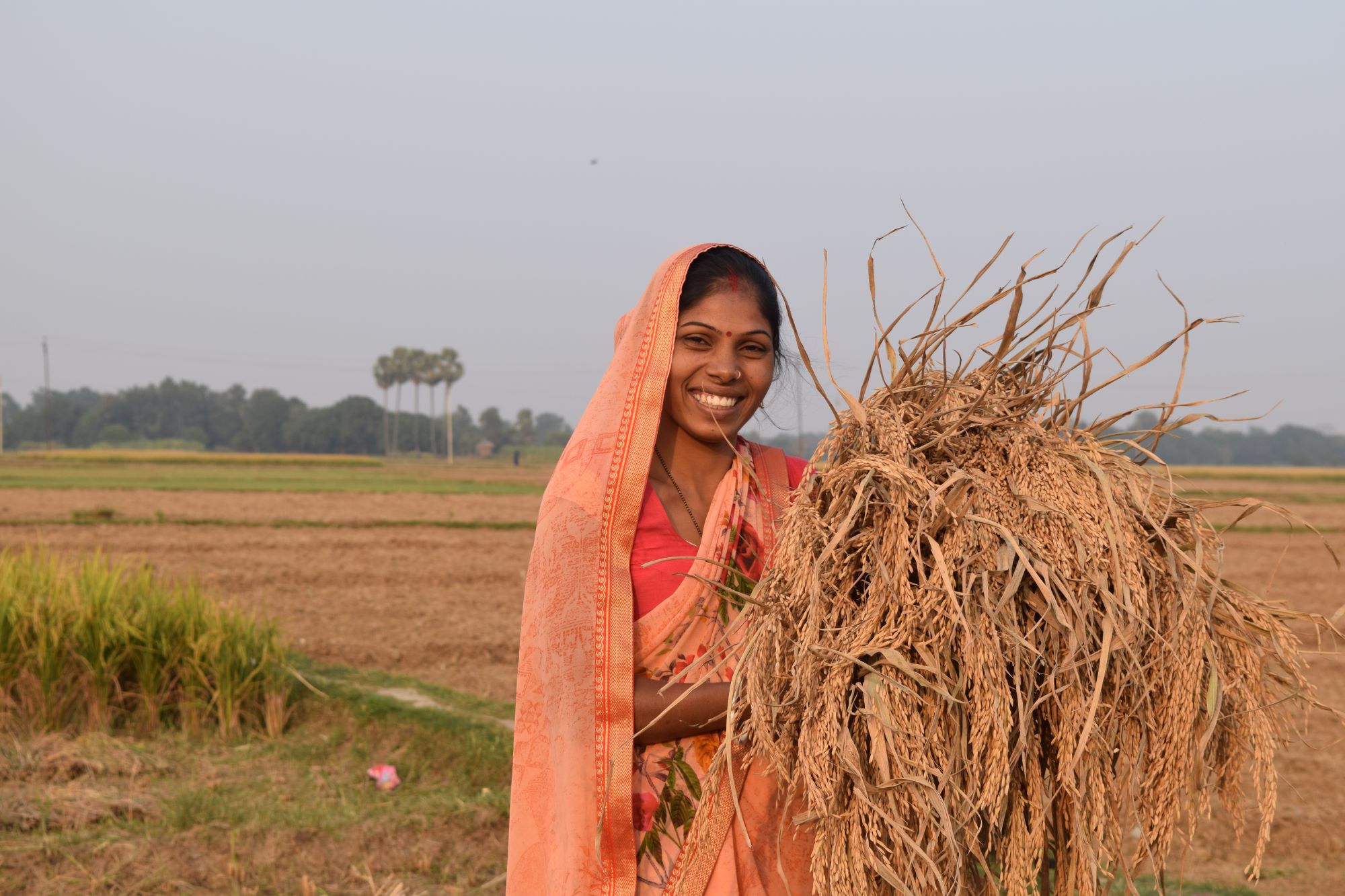Solidaridad’s Good Farming – Good Food (GFGF) initiative in Madhya Pradesh is putting food and nutritional security at the heart of farming
Madhya Pradesh is known for its rich agricultural landscape dotted with lush green farms. However, malnutrition is a pressing concern, leading to alarmingly high infant and maternal mortality rates in the state. In addition, estimates suggest that over 50% of the rural population in the state, particularly women and children, is anaemic.
It is, therefore, quite ironic that a solution to these ills stares one right in the face if only one knows where to look for it. The state is the largest producer of soybean, one of the most affordable sources of protein. Yet, communities growing this crop are among the most impoverished, and traditional models of nutritional improvement have had limited impact so far. More institutionalised mechanisms with community ownership need to be encouraged and implemented.
Towards Improving Health and Nutrition Levels of Rural Households
Committed to sustainable development, Solidaridad is working to address nutrition and health issues in rural Madhya Pradesh with its Good Farming – Good Food (GFGF) initiative. Implemented in five districts covering around 420 villages, the programme aims to revolutionise farming practices, ensuring bountiful harvests and food and nutritional security.
The GFGF programme actively contributes to the United Nations’ sustainable development goals (SDGs) — in particular, SDG 2 (Zero Hunger), aimed at eradicating hunger, improving nutrition levels and promoting sustainable agriculture.
A trained nutrition team leads awareness initiatives to disseminate crucial information about balanced diets, the significance of key nutrients, and the impact of nutrition on overall health in project areas. For this purpose, the team has been running a platform that delivers knowledge on beneficial practices to the communities. Acting as a significant service-provider, the team also reaches out to and interacts closely with community members.
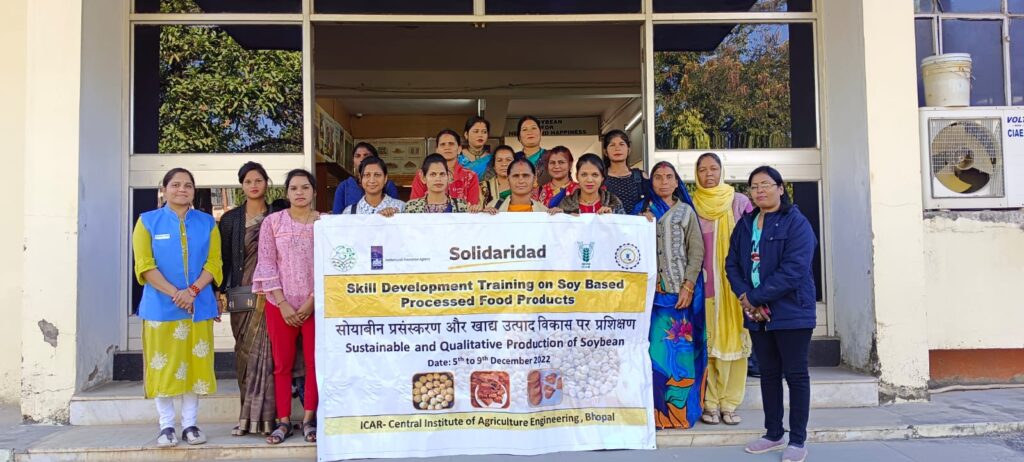
Integral Components of the Programme
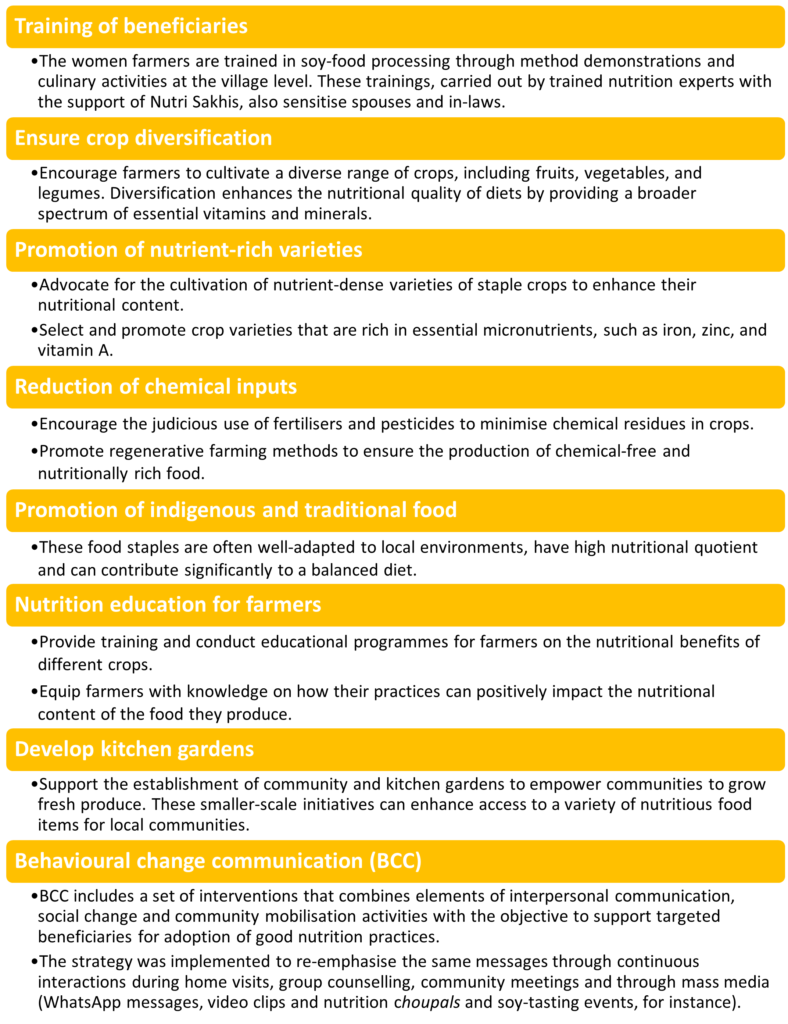
Bestowing Health: Hema’s Journey to Wellness
Like many others in the village of Karadiya Pari in Dewas district, Hema had limited knowledge of the importance of proper nutrition during pregnancy. Malnutrition was widely prevalent — and Hema, in her role as an anganwadi worker, had witnessed its adverse effects on pregnant women and their infants.
The GFGF campaign in Hema’s village transformed things for the better by providing educational materials, conducting workshops and spreading awareness on the need for balanced diets, especially during pregnancy. Since early 2022, Hema has eagerly participated in these sessions, learning and making use of everything the programme has to offer. Now, she finds herself at the forefront of a health revolution.
In Hema’s village, the programme focused on one key aspect: the inclusion of soy-based food and homegrown vegetables in daily meals. Hema was drawn to this aspect as it seemed practical and accessible. To further help matters, the nutrition team distributed soy seeds and provided instructions on setting up home gardens. Guided by this knowledge, Hema decided to implement these changes in her own life.
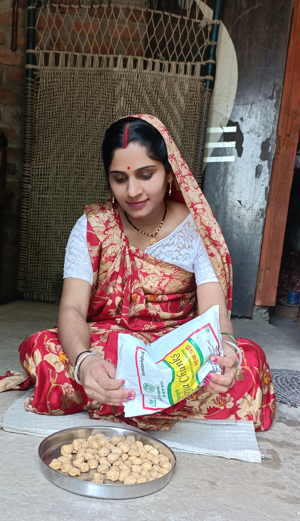
She started adding soy products such as soy chunks and soy milk into her diet, to ensure an optimum protein intake. She also cultivated a small vegetable garden around her home, growing a mix of beans, tomatoes and leafy greens, relying on the gardening techniques she has learnt in the GFGF programme. The GFGF has also been providing nutritional counselling during the time of her pregnancy.
Her commitment to a nutritious lifestyle has not gone unnoticed; it has inspired other women in her village to do the same. More and more women have started participating in the GFGF initiative, leading to a positive ripple effect. Hema’s personal success story itself has become a useful tool in subsequent GFGF awareness campaigns. She has shared the story of her journey numerous times in community meetings, highlighting the health benefits of soy and homegrown vegetables. The dietary changes have been wholeheartedly embraced by the villagers, leading to a visible reduction in the number of cases of malnutrition, especially among pregnant women.
The Bigger Picture
The GFGF initiative aligns itself with several goals and missions at the national and state levels. The significant ones include:
- The soybean revolution
In the quest for sustainable and nutritious food sources, the GFGF programme has embraced a transformative approach by promoting soybean-based foods. Soybeans are a nutritional powerhouse, packed with high-quality protein, essential amino acids, and a range of vitamins and minerals. Recognising the potential to address protein deficiencies, the programme encourages farmers to integrate soybeans into their agricultural practices. The promotion of soy-based food is a nutritional cornerstone, contributing to well-balanced diets, particularly in communities where access to diverse and nutrient-rich foods is limited. This proactive approach goes beyond immediate relief, and aims for sustained improvement in public health.
The success of the GFGF programme is also underscored by the decision to include soy chunks in mid-day meals. This strategic move by the government of Madhya Pradesh represents a synergy between agricultural practices and public health, yielding positive outcomes on multiple fronts.
- National forum for soy-food promotion
Solidaridad is working together with The Soybean Processors Association of India (SOPA) for the formation of a forum to promote soy food in India. The forum will bring together research institutes, businesses and farmers’ organisations, beyond the project consortium and support partners. It will serve as a central hub for the exchange of information on the progress of projects and lessons learnt on best practices. It will also facilitate collaborations and synergy with relevant government schemes. Ultimately, it will also ensure the continuation of projects beyond their prescribed periods.
To this end, an MoU was signed with the Indian Institute of Soybean Research (the premier institute for studies in soybean) to promote collaborative efforts on sustainable soybean production technologies, multiplication of improved food-grade soy varieties, training and capacity-building of farmers, and encouraging the consumption of soy-based food in the interest of farmers and farming communities, youths, entrepreneurs, processors and consumers.
- Alignment with POSHAN Abhiyaan (formerly National Nutrition Mission)
The project’s interventions are well aligned with POSHAN Abhiyaan, the Government of India’s flagship programme to improve nutritional outcomes for children, pregnant women and lactating mothers. Under the programme, poshan maah (nutrition month) is observed in September every year. This time too, Solidaridad took part in the celebrations by collaborating with the local administration in their efforts. The month saw activities such as slogan writing, visits to the poshan vatika (nutrition garden) and sessions on explaining the importance of nutritious food to pregnant women and adolescent girls. Other vital interventions undertaken during the month include training of stakeholders (for example, mid-day meal cooks, Anganwadi workers and household members), establishing and monitoring the nutrition garden to ensure healthy intake of vegetables, awareness meetings on various health issues, with a special focus on parents of malnourished children (along with discussions on nutrition with rural households and stakeholders), and culinary activities, especially food prepared with ingredients available locally (plus a live demonstration of soy-food preparation).
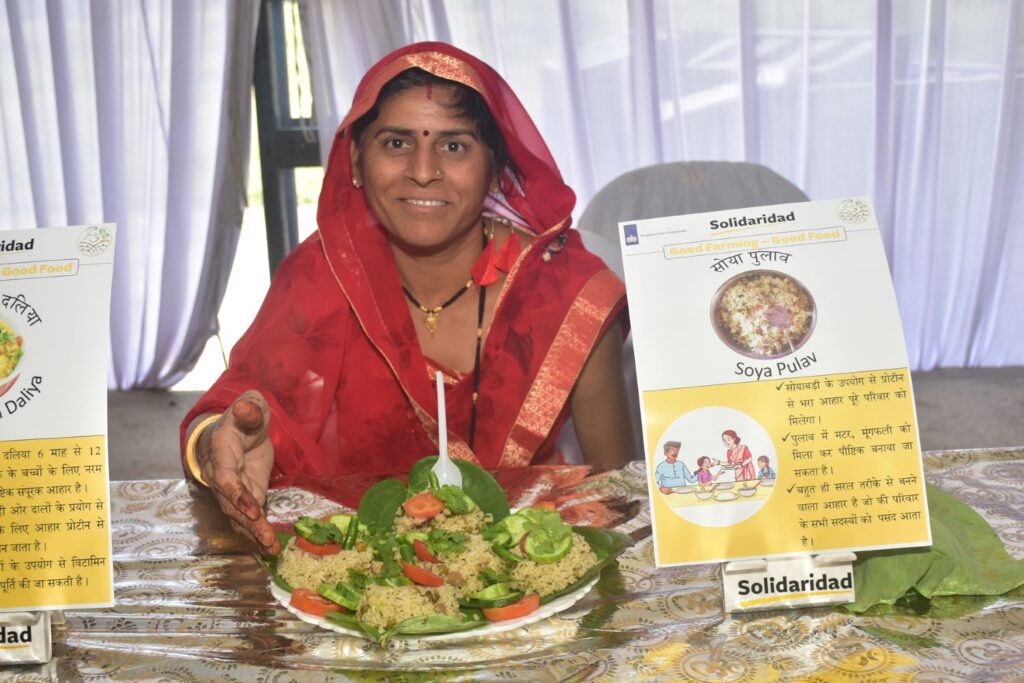
Closing the Gap
Madhya Pradesh’s journey towards better nutrition is a remarkable story of knowledge gathering, community engagement, collaboration, and transforming the state’s future. In this quest, the knowledge of the potential of soy is unlocking new culinary horizons, while community mobilisation is building bridges of trust and awareness.
“Through sustainable agriculture techniques, we empower our farmers to grow nutritious, pesticide-free produce that not only enriches their livelihoods but also enhances the health of their families. The GFGF programme strives to create a ‘cycle of health’, where healthy farming practices lead to nourishing food, which, in turn, results in the holistic health and happiness of our farmers and their families. We are not only growing crops; we are growing a healthier future,” says Suresh Motwani, Programme Coordinator, GFGF. As the sun sets on a month of learning and sharing, the hope for healthier lives in Madhya Pradesh shines brighter than ever.




